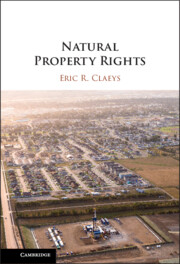Book contents
- Natural Property Rights
- Natural Property Rights
- Copyright page
- Contents
- Acknowledgments
- Note on Cover
- Table of Cases
- Table of Legislative Materials
- Table of Multiple Edition Works
- Part I Foundations
- Part II The Natural Right to Property
- 4 Property’s Subject Matter and Interest
- 5 Property’s Elements and Scope
- 6 Property’s Conceptual Structure
- 7 Property, Natural Law, and Nozick
- Part III Property Law
- Part IV Property in Common Law and Public Law
- Index
- References
4 - Property’s Subject Matter and Interest
from Part II - The Natural Right to Property
Published online by Cambridge University Press: 17 April 2025
- Natural Property Rights
- Natural Property Rights
- Copyright page
- Contents
- Acknowledgments
- Note on Cover
- Table of Cases
- Table of Legislative Materials
- Table of Multiple Edition Works
- Part I Foundations
- Part II The Natural Right to Property
- 4 Property’s Subject Matter and Interest
- 5 Property’s Elements and Scope
- 6 Property’s Conceptual Structure
- 7 Property, Natural Law, and Nozick
- Part III Property Law
- Part IV Property in Common Law and Public Law
- Index
- References
Summary
This chapter explains what property covers and what interest it serves. Property is the field for legal and social relations for separable resources. And property serves an interest people have in acquiring and using separable resources for survival or flourishing. This chapter relies on work by James Penner and Neil MacCormick to introduce separability. This chapter studies property in body parts, names, identities, and slaves.
- Type
- Chapter
- Information
- Natural Property Rights , pp. 75 - 81Publisher: Cambridge University PressPrint publication year: 2025

